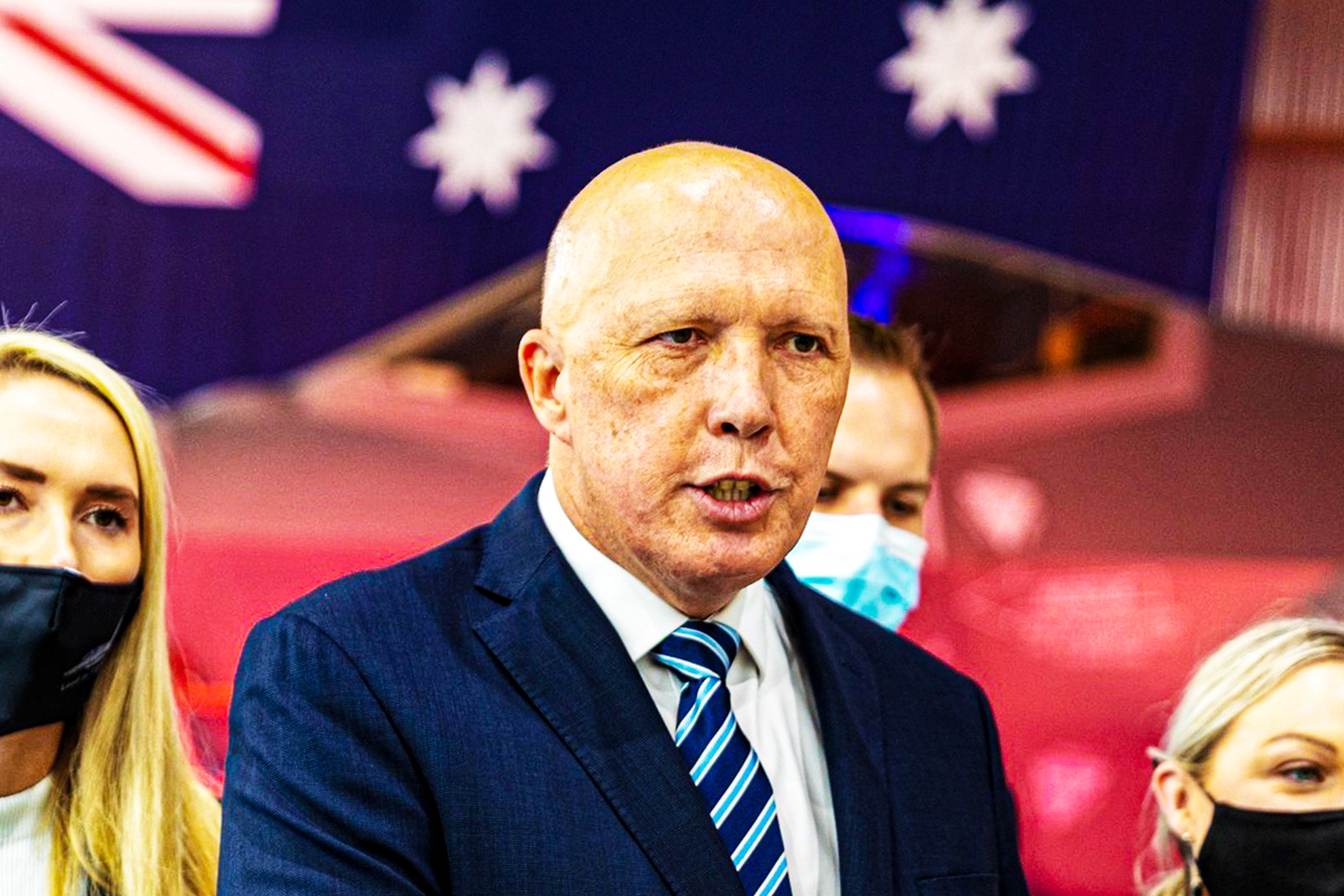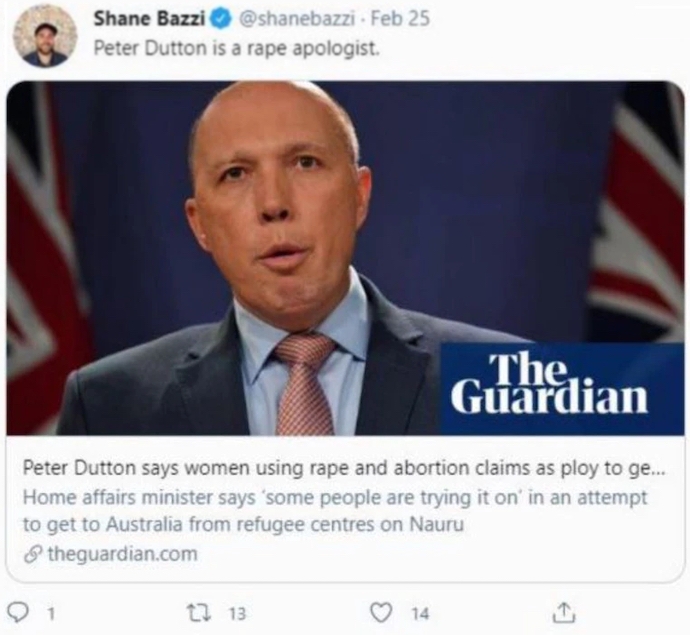
Peter Dutton’s Defamation Defeat
The occasion when an activist, writer, or commentator triumphs over a defamation lawsuit launched by a thin-skinned politician are rare in Australia. When it comes to matters regarding the law of reputation, Australia remains a place where parliamentarians, as a species, thrive in the knowledge they can use favourable provisions to protect their hurt feelings and soiled reputations.
The country, in also lacking a bill of rights protecting free speech and the press, has further emboldened politicians. At best, the Australian High Court has only left an anaemic implied right “to protect freedom of communication on political subjects,” which should really be read as a restraint on executive and legislative power, never to be personally exercised.
Defence Minister Peter Dutton, the enforcer of the Morrison government, was one who had every reason to feel confident when he took refugee activist Shane Bazzi to court in April last year. In February 2021, Bazzi published a six-word tweet: “Peter Dutton is a rape apologist.”

The tweet was made some hours after Dutton had told a press conference that he had not been furnished with the finer details of a rape allegation made by former Coalition staffer Brittany Higgins. The context here was also important. Dutton had, when Home Affairs Minister, characterised refugee women being held on Nauru, one of Australia’s carceral domains, as “trying it on” to get access to the Australian mainland for medical treatment.
The following month, Dutton promised that he would start to “pick out some” individuals who were “trending on Twitter or have the anonymity of different Twitter accounts” posting “all these statements and tweets that are frankly defamatory.” It was an informal declaration of war against critics.
In instigating proceedings against Bazzi, Dutton claimed in the trial that he was “deeply offended” by the contents of the tweet. He accepted that, “As a minister for immigration or home affairs…people make comments that are false or untrue, offensive, profane, but that’s part of the rough and tumble.” But Bazzi had gone one step too far. “It was somebody that held himself out as an authority or a journalist.” His remarks “went beyond” the tolerably bruising nature of politics. “And it went against who I am, my beliefs…I thought it was hurtful.”
In finding for Dutton in November and awarding $35,000 in damages, Justice Richard White ruled that the tweet had been defamatory, and that Bazzi could not resort to the defence of honest opinion. Dutton failed to gain damages in three of the four imputations, while also troubling the judge with his hunger in pursuing the defendant for the full legal bill. But in his remarks on Bazzi’s claim of honest opinion, White was dismissive. “Bazzi may have used the word ‘apologist’ without an understanding of the meaning he was, in fact conveying.” If this had been the case, “it would follow that he did not hold the opinion actually conveyed by the words.”

On May 17, Bazzi found that he had convinced the Full Court of the Federal Court that the reasoning behind the six-word tweet, and the purportedly defamatory imputations it conveyed, was flawed. Justices Steven Rares and Darryl Rangiah, in a joint judgment, found that Justice White had erred in not explaining “how the reader would understand the whole (or any part) of the tweet to convey the imputation.” They also noted that Justice White had found the meaning of the word “apologist” was not that of an excuser but of a defender. “When the material is read with Mr. Bazzi’s six words, the reader would conclude that the tweet was suggesting that Mr. Dutton was sceptical about claims of rape and in that way was an apologist.” It was “very different from imputing that he excuses rape itself.”
The judges put much stock in the context of the tweet, and the need to read it alongside Dutton’s previous remarks on the women held on Nauru as recorded in The Guardian. “The reader would perceive that the message in the tweet consisted of both parts, Mr. Bazzi’s six-word statement and The Guardian material, read together.” When read together, the reader “would understand that the point that the tweet was conveying was that a ‘rape apologist’ behaves in the way Mr. Dutton had in expressing scepticism about the claims of rape. That is a far cry from conveying the meaning that he excuses rape itself.”
Justice Michael Wigney also found that the primary judge had erred in finding the tweet defamatory and “substantially agreed” with the two other justices. It was “tolerably clear” that Bazzi’s statement “was about, or responsive to, the extract from The Guardian article.” The primary judge had erred in how the ordinary reasonable Twitter user would have read the tweet, downplaying, for instance, the significance of the link to the article.
Accordingly, “It was wrong for the primary judge, in analysing whether Mr. Bazzi’s tweet conveyed the alleged imputation, to dissect and segregate the tweet in the way he did.” While the tweet did convey “an impression that is derogatory and critical of [Dutton’s] attitude to rape or rape allegations,” it did “not go so far as to convey the impression that [Dutton] is a person who excuses rape.”
Dutton’s litigious boldness was much in keeping with the Morrison government’s general hostility to social media outlets and the Internet, in general. Prime Minister Scott Morrison has shown a willingness to do battle with social media and making the platforms assume greater responsibility for material hosted on their sites. Taking advantage of the killings in Christchurch in March 2019, he exploited the chance to pursue a global agenda of online censorship. “We urge online platforms to step up the ambition and pace of their efforts to prevent terrorist and VECT (violent extremism conducive to terrorism) content being streamed, uploaded, or re-uploaded.”
In the latter part of last year, the government announced that it was drafting laws that would make social media companies gather user details and permit courts to force the divulging of user identities in defamation proceedings. While a re-elected Morrison government will be a dark day for Internet freedoms and expression, Dutton’s defeat is a cause for genuine celebration. It also heralds the need to water down the persistently draconian nature of laws that do all too much in protecting that strange animal known as the offended politician.

